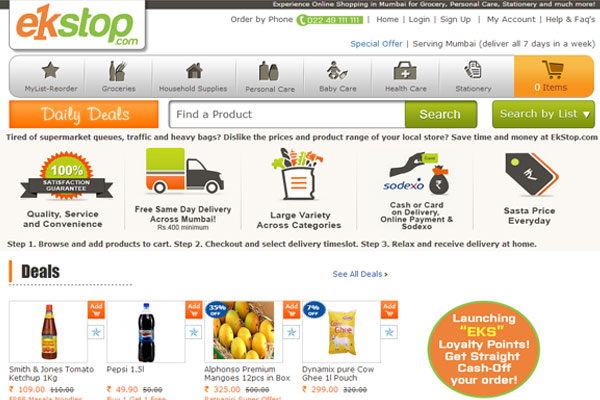
Grocery e-tailer Ekstop seeking to make a mark where others failed, eyeing multi-city growth

Ekstop, an online store dealing in grocery and daily essentials, claims to be doing around 165 orders a day with an average transaction value pegged at Rs 1200-1300. Currently operating only in Mumbai, the startup is now looking to expand into other cities like Delhi, Bangalore and Pune.
Talking to Techcircle.in, co-founder and CEO Sumat Chopra said that the company is witnessing some good traction. "We are seeing 96 per cent repeat customers on a monthly basis. Also, going by our analysis and trends, regular customers are shopping at Ekstop at least twice a month," he added.
Going by the numbers mentioned by Chopra, Ekstop could be doing a monthly GMV of around Rs 60-64 lakh.

Ekstop Shop Pvt Ltd, the company behind the online grocery store, was founded in May 2012 by Sumat Chopra and Shaurya Mehta. It raised funding from a group of angel investors immediately after starting operations. These investors include Jayesh Parekh (co-founder of Sony Entertainment Television), Deepak Shahdadpuri (head of Beacon India Private Equity Fund), Patrick Turner (he runs the entrepreneurship department at INSEAD), Jungle Ventures, Sanjay Kamlani (co-CEO of Pangea3), and some senior executives of Google and McKinsey.
Last year, too, Chopra told us the company would be expanding into other cities. Asked why those expansion plans were delayed, he said that the startup had taken it slow and easy because the founders wanted to get it right in the first market before venturing out.

"The grocery supermarket in Mumbai is worth $4 billion and we wanted to get things right here first. We have worked hard on sourcing, warehousing and logistics, and perfected those by now. To expand to other cities, we just need to replicate our model," said Chopra. Ekstop promises 1-4 hour delivery in Mumbai region and counts it as one of its USPs.
It makes sense since the category, although a new one, has already seen one casualty when Mumbai-based Shopveg shut shop last year. According to Shopveg co-founder Saurabh Dhapodkar, the business was booming but they had to shut shop due to lack of funds. According to him, it is a capital intensive business and needs funds to expand.
Chopra, however, feels optimistic. "It is still a fresh category, so we don't have too many competitors. Most of the players are new in this space and market leaders have not emerged yet. Moreover, there are high entry barriers, which prove to be beneficial for existing players," he said about the competitive landscape.

But how does Ekstop differ from others? Chopra said that the model it follows in terms of vendor sourcing, warehousing and logistics happen to be the differentiation. "For one, we ensure same-day delivery. Most of these utility items are ordered in the morning and customers want those by evening. So we ensure that. Also, we have some good return policies in place for manufacturers. We return the unsold SKUs at a mutually agreed timeframe," he added. He had also shared that compared to certain other categories groceries and vegetables have a higher margin. He shared that their contributing margins are about 11-12 percent in this category.
The startup now wants to expand to cities like Pune, Delhi and Bangalore, and is looking to raise a Series A round worth $3-5 million for the same. However, it is bound to face stiff competition from bigger players like BigBasket who have multi-city operations (BigBasket is already in Mumbai, Bangalore and Hyderabad). Earlier, talking to Techcircle.in, Chopra said that Ekstop was planning to have four warehouses in Mumbai alone. He informed us that the firm now has two warehouses up and more will be in place soon. For multi-city expansion, the startup is again banking on strong logistics and supply chain.
We have spoken to investors earlier regarding e-grocery and they agreed that it is a challenging segment. Competition from local kirana stores and execution are two of the biggest hazards plaguing this sector. However, Ekstop is looking to change all that. "We provide the convenience of a local kirana store with our speedy delivery while the supply chain is our strong point," said Chopra.

Can Ekstop crack the code even though Shopveg has failed to capture the market? More importantly, is there scope for multi-city growth in e-grocery space? Share your views with us.
(Edited by Sanghamitra Mandal)

